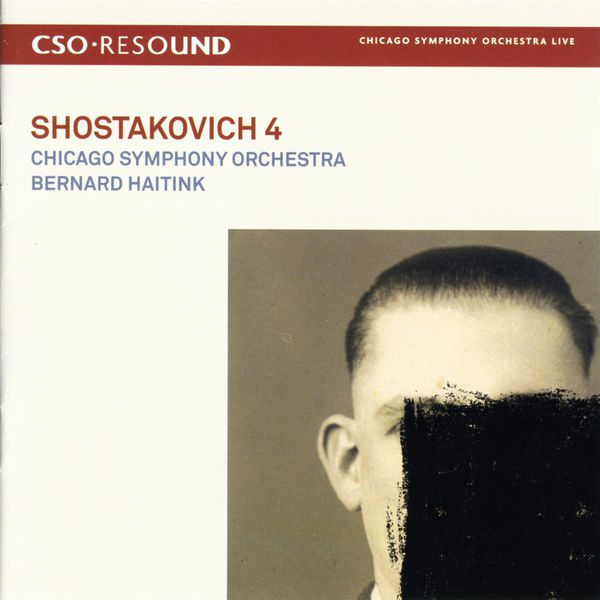
Musik-Streaming
Hören Sie dieses Album mit unseren Apps in hoher Audio-Qualität
Testen Sie Qobuz kostenlos und hören Sie sich das Album anHören Sie dieses Album im Rahmen Ihres Streaming-Abonnements mit den Qobuz-Apps
Abonnement abschließenHören Sie dieses Album im Rahmen Ihres Streaming-Abonnements mit den Qobuz-Apps
Download
Kaufen Sie dieses Album und laden Sie es in verschiedenen Formaten herunter, je nach Ihren Bedürfnissen.
Text in englischer Sprache verfügbar
The last of Dmitry Shostakovich's youthful, experimental symphonies, the Symphony No. 4 (1935-1936) marked a critical turning point, for its modernist tendencies provoked a hostile article in Pravda, thought to have been written by Stalin himself to intimidate the composer. Because of this rebuke, the symphony was withdrawn from performance and not played again until 1961, so due to its comparatively late absorption in the repertoire, it is one of the least played of Shostakovich's symphonies. Yet this is one of his most gripping scores, full of volatile expressions and memorable ideas, and its expansive form, caustic themes, complex developments, and wide emotional range make it comparable in many ways to the symphonies of Gustav Mahler, on which it was partly modeled. Bernard Haitink and the Chicago Symphony Orchestra present this masterpiece in the CSO Resound line, and the results are breathtaking in this transparent audiophile recording. Haitink's long career of conducting Shostakovich puts him among the most authoritative interpreters, and he leads the orchestra with assurance through the work's mercurial moods and carefully guides it through treacherous technical difficulties, perhaps most impressively in the fugal flurries of the first movement's Presto section. The sound throughout is detailed, yet also spacious, so listeners have all the advantages of one without losing the other, and the crisp lines stand out all the more because of the depth of the reproduction. The symphony is paired with a bonus DVD, which features a documentary on Shostakovich, Is Music Dangerous?, with narrator Gerard McBurney and actor Nicholas Rudall, and excerpts from the CSO's performance of the Symphony No. 4.
© TiVo
Sie hören derzeit Ausschnitte der Musik.
Hören Sie mehr als 100 Millionen Titel mit unseren Streaming-Abonnements
Hören Sie diese Playlist und mehr als 100 Millionen Tracks mit unseren Streaming-Abonnements
Ab 12,49€/Monat

Bernard Haitink, Conductor - Bernard Haitink, Conductor
Bernard Haitink, Conductor - Bernard Haitink, Conductor
Bernard Haitink, Conductor - Bernard Haitink, Conductor
Albumbeschreibung
The last of Dmitry Shostakovich's youthful, experimental symphonies, the Symphony No. 4 (1935-1936) marked a critical turning point, for its modernist tendencies provoked a hostile article in Pravda, thought to have been written by Stalin himself to intimidate the composer. Because of this rebuke, the symphony was withdrawn from performance and not played again until 1961, so due to its comparatively late absorption in the repertoire, it is one of the least played of Shostakovich's symphonies. Yet this is one of his most gripping scores, full of volatile expressions and memorable ideas, and its expansive form, caustic themes, complex developments, and wide emotional range make it comparable in many ways to the symphonies of Gustav Mahler, on which it was partly modeled. Bernard Haitink and the Chicago Symphony Orchestra present this masterpiece in the CSO Resound line, and the results are breathtaking in this transparent audiophile recording. Haitink's long career of conducting Shostakovich puts him among the most authoritative interpreters, and he leads the orchestra with assurance through the work's mercurial moods and carefully guides it through treacherous technical difficulties, perhaps most impressively in the fugal flurries of the first movement's Presto section. The sound throughout is detailed, yet also spacious, so listeners have all the advantages of one without losing the other, and the crisp lines stand out all the more because of the depth of the reproduction. The symphony is paired with a bonus DVD, which features a documentary on Shostakovich, Is Music Dangerous?, with narrator Gerard McBurney and actor Nicholas Rudall, and excerpts from the CSO's performance of the Symphony No. 4.
© TiVo
Informationen zu dem Album
- 1 Disc(s) - 3 Track(s)
- Gesamte Laufzeit: 01:10:19
- 1 digitales Booklet
- Künstler: Bernard Haitink
- Komponist: Dimitri Chostakovitch
- Label: CSO Resound
- Genre: Klassik
 Warum Musik bei Qobuz kaufen?
Warum Musik bei Qobuz kaufen?
-
Streamen oder downloaden Sie Ihre Musik
Kaufen Sie ein Album oder einen einzelnen Track. Oder hören Sie sich mit unseren hochqualitativen Streaming-Abonnements einfach den ganzen Qobuz-Katalog an.
-
Kein DRM
Die heruntergeladenen Daten gehören Ihnen ohne jegliche Nutzungsbeschränkung. Sie können sie sooft herunterladen wie Sie möchten.
-
Wählen Sie das Format, das am Besten zu Ihnen passt
Sie können beim Download Ihrer Einkäufe zwischen verschiedenen Formaten (FLAC, ALAC, WAV, AIFF...) wählen.
-
Hören Sie Ihre Einkäufe mit unseren Apps
Installieren Sie die Qobuz-Apps für Smartphones, Tablets und Computer und hören Sie Ihre Musikeinkäufe immer und überall.



